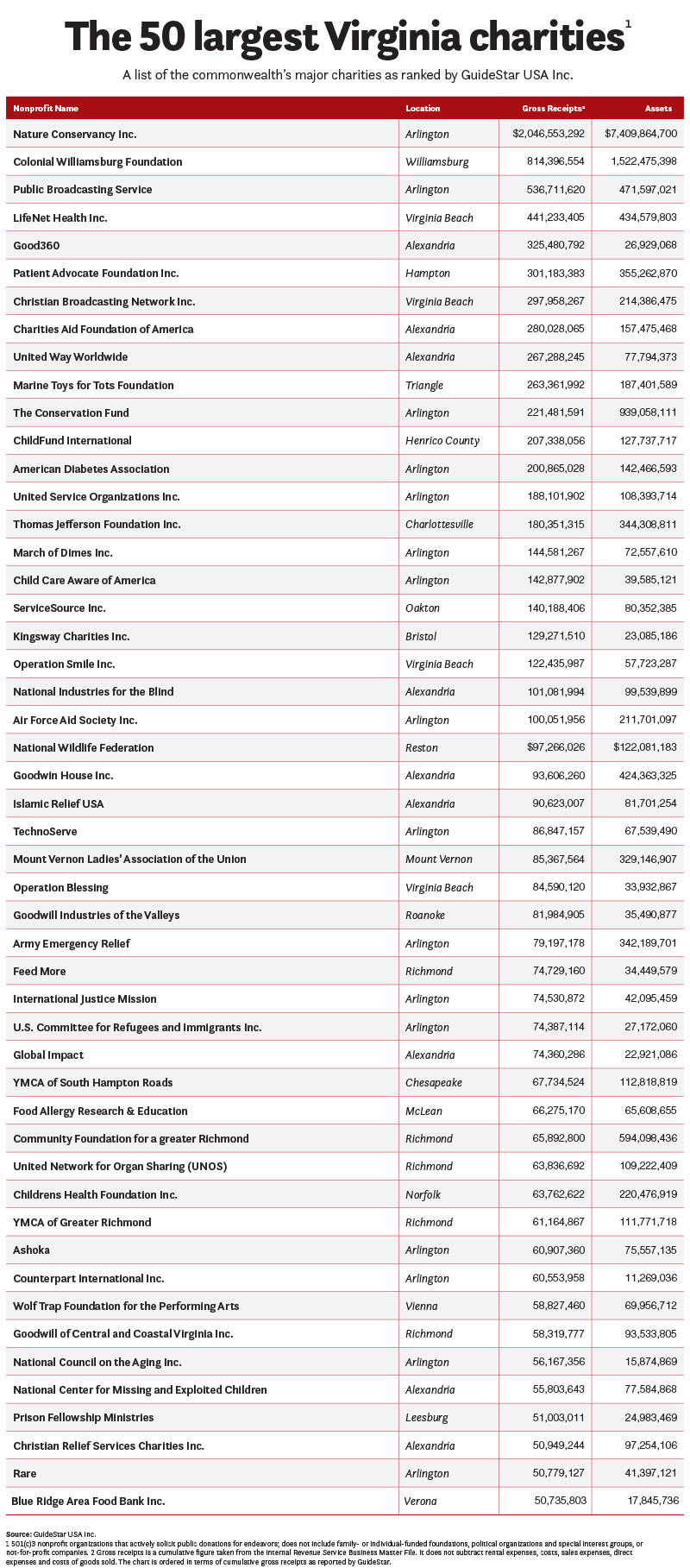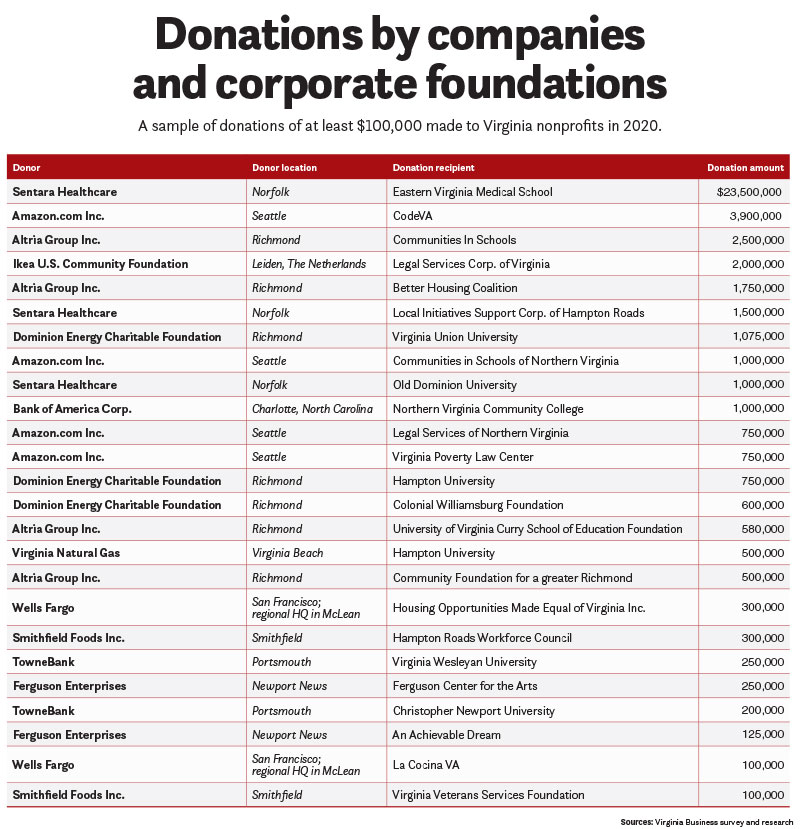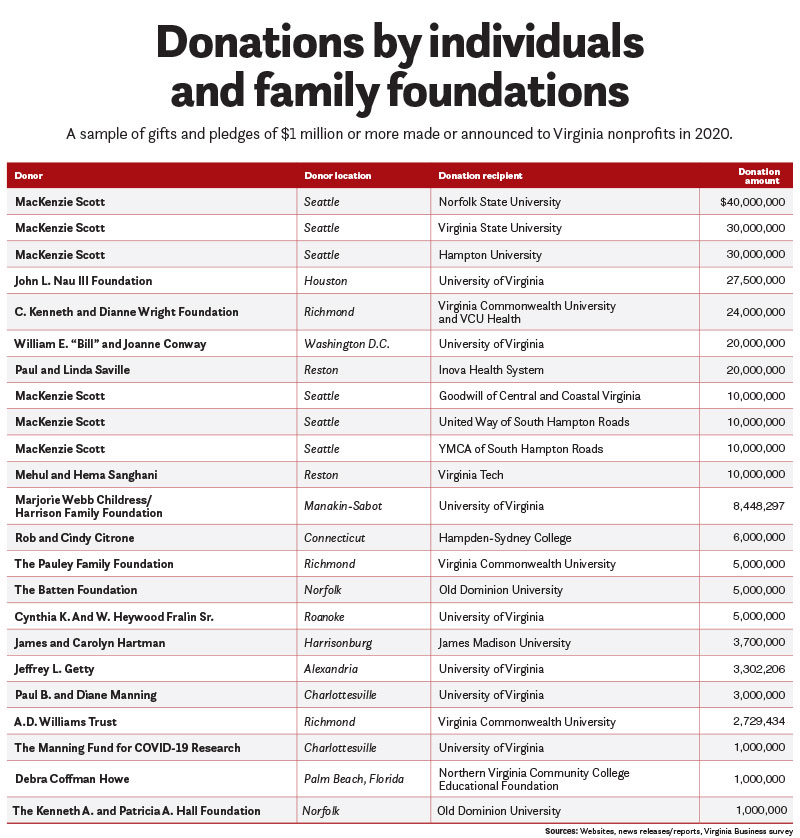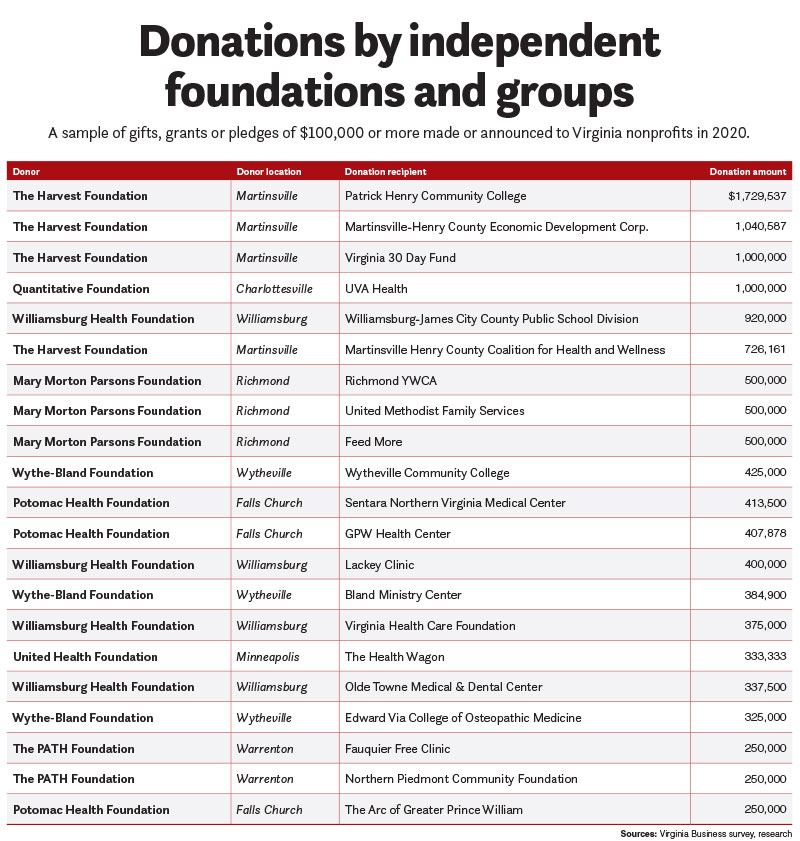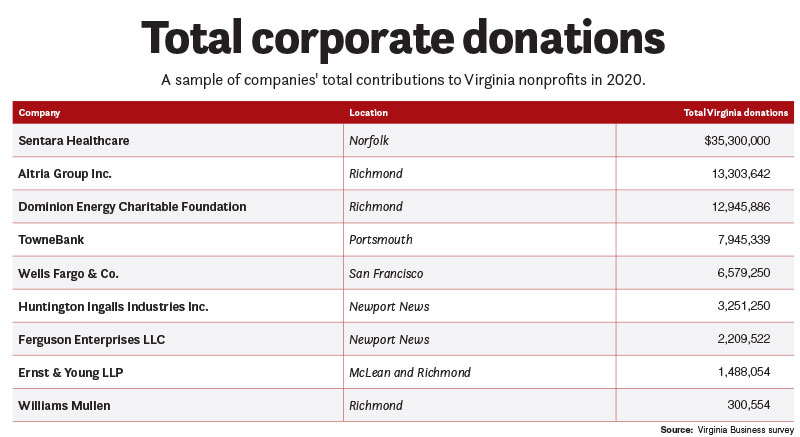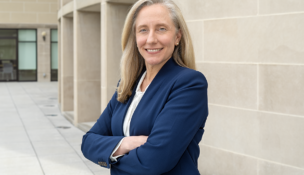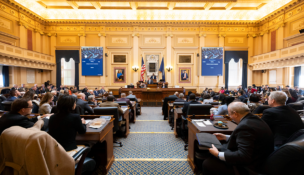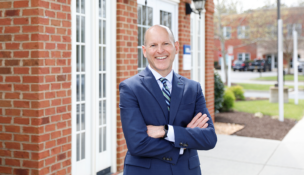The best of times?
Year of pandemic and civil strife also saw transformative giving
The best of times?
Year of pandemic and civil strife also saw transformative giving
The past year or so in America has often seemed a dark time, with headlines dominated by COVID-19, the tumult surrounding social justice issues and our deeply politically divided nation. Yet, it also has been a time of breathtaking generosity, as uber-wealthy philanthropists and well-heeled corporations have opened their wallets to fund groundbreaking initiatives, especially in the fields of education and health care.
Here are the stories of two Virginia families whose altruism could make a major difference for many, many years to come, along with a roundup of some other impressive gifts made in the last year, either by Virginians or benefiting the people of the commonwealth.
The Goodwins
In 2016, then-Vice President Joe Biden launched the federal Cancer Moonshot initiative to fight the disease that killed his son, Beau. And as president, in his first joint address to Congress, Biden urged lawmakers this April to “end cancer as we know it” and support the creation of a new federal agency, the Advanced Research Project Agency for Health, which, Biden explained, would “develop breakthroughs to prevent, detect and treat diseases like Alzheimer’s, diabetes and cancer.”
Biden wants to turbocharge the fight against a disease that kills almost 600,000 Americans annually.
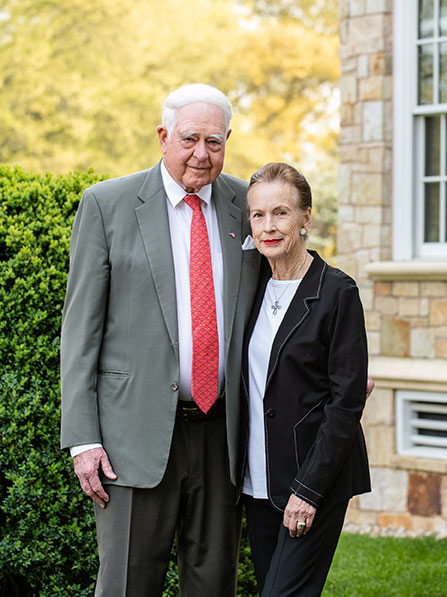
Virginia philanthropist William Goodwin Jr. and his wife, Alice, who lost their son Hunter to cancer in January 2020, share Biden’s zeal for finding cancer treatments and cures. The couple announced in March that they are donating $250 million to kickstart a national cancer research foundation called Break Through Cancer. Half of the funding will come from their late son’s estate.
The Goodwins have generously and consistently supported cancer research and other endeavors for 20 years. (They were in the news in April for giving $5 million to Mary Baldwin University to establish a doctor of nursing practice degree program. See page 13.)
But their funding of Break Through Cancer is on a different scope entirely. It is nothing less than an ambitious attempt to change the nature of cancer research.
Goodwin, the retired chairman and president of Richmond-based Riverstone Group LLC, explains that medical research is largely a territorial enterprise, and intellectual property — along with the royalties it generates — “is protected like it’s in a vault.” But the impressive rapidity with which vaccines to fight COVID-19 were developed through cooperative scientific efforts shows that competition is not the only way forward, or even the best way. Break Through Cancer is a daring initiative to test that theory.
The new foundation, which will be based in Boston, brings together five of the nation’s most prestigious cancer research institutions — Dana-Farber Cancer Institute in Boston; Sidney Kimmel Comprehensive Cancer Center at Johns Hopkins in Philadelphia; MD Anderson Cancer Center in Houston; Memorial Sloan Kettering Cancer Center in New York City; and Koch Institute for Integrative Cancer Research at MIT in Cambridge, Massachusetts.
Researchers at the institutions will collectively focus on four of the deadliest kinds of cancer — the kind that usually kill in 18 months or less: pancreatic cancer, ovarian cancer, glioblastoma (which killed Beau Biden) and acute myelogenous leukemia.
“We’d like to be seeing real results in three years,” Goodwin says. “If we don’t see results within five years, we aren’t making it.”
Tyler Jacks, director of MIT’s Koch Institute, will oversee Break Through Cancer. Three or four years ago, he says, the research institutions began discussing whether “there would be value in joining forces.” That long journey, he says, leads “directly to the generosity of the Goodwin family.”
The foundation is in the “brainstorming phase” now, he says, but Jacks hopes to begin funding research grants by this summer. The research teams dedicated to each of the four types of cancer will have no physical lab space but will be more akin to think tanks.
“Think of it as a poker game with five expert players all trying to come up with a winning hand,” Jacks says. “We’ll be taking the best cards from all the hands. If things go very well, we’ll see major scientific breakthroughs.”
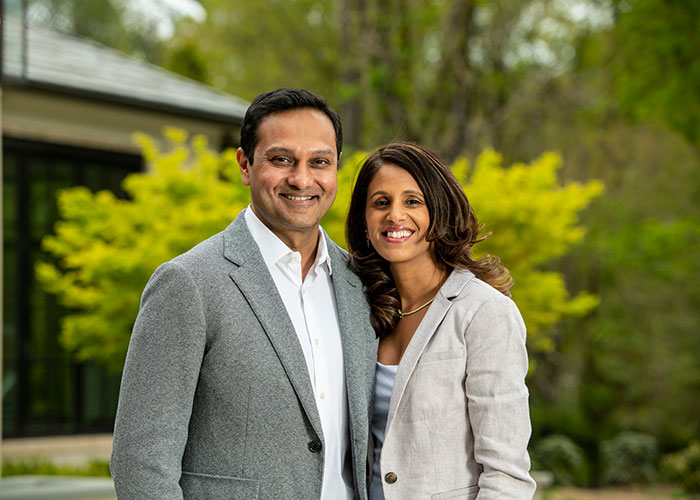
The Sanghanis
Mehul Sanghani and his wife, Hema, grew up in nearby towns in Central Virginia and met when both attended Virginia Tech. Since the couple graduated in 1998 and 1999, he went on to found Reston-based Octo Consulting, which delivers information technology and artificial intelligence services to government and commercial clients. She became a manager at Fairfax-based CGI Federal Inc., which also provides IT services to federal clients.
With their shared focus on technology, it’s not surprising that the two loyal Hokies might support their alma mater’s efforts involving artificial intelligence and data
analytics. What is surprising is the size of the $10 million gift the couple made to the university last year. Announced this January, $7.4 million of their donation is earmarked to support the Sanghani Center for Artificial Intelligence and Data Analytics, formerly called the Discovery Analytics Center. The remainder of their gift will support an initiative to improve food access for students; Virginia Tech Athletics; and the Global Business and Analytics Complex planned for the Blacksburg campus.
Some of the Sanghanis’ gift also will support disadvantaged and minority students.
The Sanghanis are the youngest alumni couple to ever have made a gift of such size to their alma mater.
“Virginia Tech is where we both met and it opened the doors of opportunity to both Mehul and myself,” Hema Sanghani said in the university’s announcement. “We believe we have a responsibility to give back to the school that has afforded us so much.”
Projected to be completed in 2024, the Sanghani Center will be housed in the first building slated to open on Virginia Tech’s new $1 billion Innovation Campus in Alexandria.
“The gift will allow [Virginia Tech] to expand efforts to make strategic hires and bring on folks in AI,” says Mehul Sanghani.
Naren Ramakrishnan, who heads the Sanghani Center, expects his current faculty of 20 to grow to 30 to 35. The center’s population of about 120 full-time graduate students will double in size. “I view this as an excellent opportunity to enlarge our ambitions,” he says. “It’s a huge step and an opportunity for us.”
Ramakrishnan plans for the center to leverage the proximity of Amazon.com Inc.,
which is building its HQ2 East Coast headquarters in Arlington, and other heavy-hitting tech organizations in the area to create a “back-and-forth synergy.” The emphasis, he says, will be on “use-inspired research with practical applications.”
About $1.5 million of the Sanghanis’ gift will support The Market of Virginia Tech, a food-support program that initially will provide up to 75 students with ingredients for a full week of meals.
“There’s this cliché of college students and ramen noodles,” Sanghani says, but food security among students, especially graduate students who may have families, “is a major, major issue.” The scope of the need, he says, “was eye-opening for us.”
In a January news release announcing the Sanghanis’ gift, Virginia Tech President Tim Sands said the alumni couple’s “decision to step forward in such a meaningful way exemplifies the Virginia Tech spirit of Ut Prosim (That I May Serve).”
Other major gifts
Last year, MacKenzie Scott, ex-wife of Amazon.com Inc. founder and CEO Jeff Bezos and the world’s third-wealthiest woman, gave away nearly $6 billion to hundreds of nonprofits and organizations across the United States. She emphatically demonstrated her commitment to supporting historically Black universities and colleges with gifts of $40 million to Norfolk State University, $30 million to Virginia State University and $30 million to Hampton University. All of Scott’s gifts fell into the category of largest-ever donations to the colleges from a single donor.
In December 2020, Scott further gave $10 million to Goodwill of Central and Coastal Virginia, another “largest-ever” gift for that institution. And that same month, she split $22 million among South Hampton Roads’ YMCA, YWCA and United Way. All three of the nonprofits described her gifts as “transformational.”
Other notable gifts made by Virginians or to Virginia-based organizations over the last year include:
A $50 million, multiyear commitment in May from Chicago-based aerospace and defense contractor Boeing to foster diversity at the Virginia Tech Innovation Campus in Alexandria. The largest corporate donation ever made to Virginia Tech, the commitment also ties the largest private donation the university ever received. Boeing President and CEO David L. Calhoun is a Virginia Tech alumnus.
A $24 million gift in December 2020 from the C. Kenneth and Dianne Wright Foundation to Virginia Commonwealth University and VCU Health Foundation. Since 1999, the Wrights, now deceased, and their namesake foundation have given the university more than $70 million. About $16 million of the most recent donation will support the C. Kenneth and Dianne Wright Center for Clinical and Translational Research, and the other $8 million will be split between the Wright Engineering Access Scholarship Program and the Health Adult Outpatient Pavilion, which is expected to open this year.
A $9 million gift in November 2020 from Amazon.com Inc. in honor of the second anniversary of its decision to locate its East Coast headquarters in Arlington. The gift will be shared among a variety of NoVa nonprofits. Community organizations that support small businesses, military families, the environment and the arts received $3.5 million, and organizations offering legal assistance, such as the Virginia Poverty Law Center, were given $3 million. Amazon gave $1 million to nonprofits dedicated to community empowerment and racial equity, such as the Arlington Branch NAACP Scholarship Program, while another $1 million was shared by health care providers such as the Arlington Free Clinic. Amazon earmarked an additional $500,000 for organizations dedicated to literacy programs and workforce development and economic development in low-income communities, including La Cocina VA and the Literacy Council of Northern Virginia.
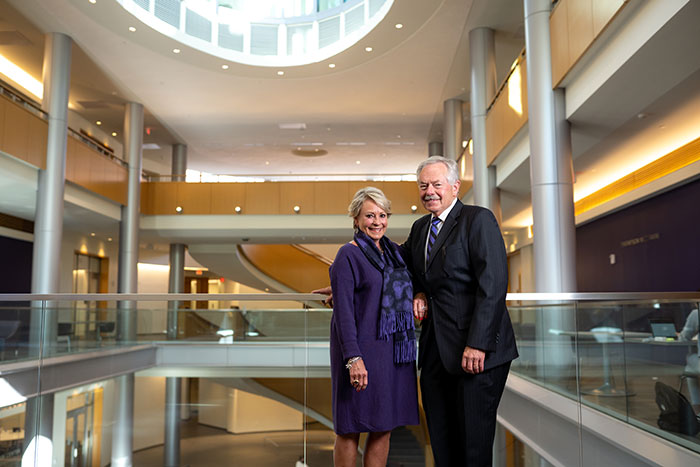
A $3.7 million gift announced in October 2020 from James and Carolyn Hartman to James Madison University. The Hartmans’ gift helped make JMU’s $66.5 million state-of-the-art Hartman Hall possible. The new building on the Harrisonburg campus is the first step in an ambitious plan to create a College of Business learning complex.
A $2 million gift in January from the Estes family and their freight-shipping company, Estes Express Lines, to the Children’s Hospital of Richmond at Virginia Commonwealth University. The money will go toward a new inpatient facility called the Wonder Tower. The Children’s Hospital Foundation, which is dedicated to maximizing the impact of donations, will match the gift. The 16-story tower will include a pediatric trauma center, an emergency room, inpatient units, operating rooms and improved amenities for families. It is expected to be completed in 2023.
A $1 million grant in November 2020 from Bank of America to Northern Virginia Community College to help minority students with education and training. Specifically, the grant will support the community college’s short-term credential program, which provides training in areas such as information technology and health care.
This spring, for the sixth consecutive year, Richmond-based Dominion Energy Inc.’s charitable foundation made $1 million in total funding available as grants of up to $25,000 for nonprofits in 16 states, including Virginia, to help meet local housing and food needs along with improving access to medical services.
A $500,000 gift made in November 2020to Hampton University from Virginia Natural Gas to improve the university’s remote learning infrastructure. The donation was part of a $50 million, multiyear initiative by Virginia Natural Gas’ parent company, Southern Co., to provide HBCU students with scholarships and internships as well as access to upgraded technology.



